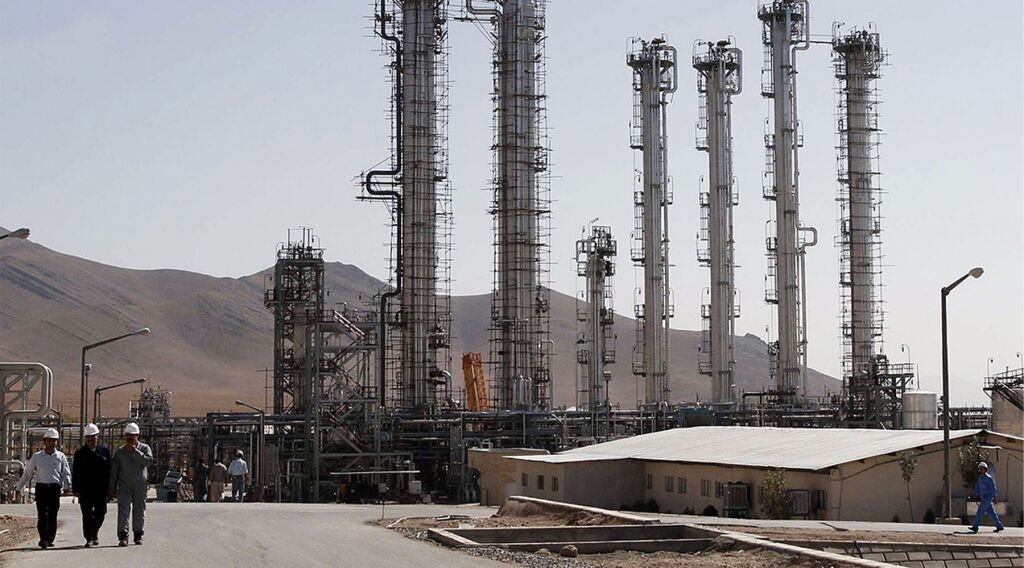
German Report: Iran Still After Nuclear Technology
According to a German domestic report released last week, Iran has increased efforts to obtain nuclear technology since the signing of the Joint Comprehensive Plan of Action (jcpoa).
The report was issued by the German Federal Office for the Protection of the Constitution (BfV). It revealed Iran’s ongoing efforts to acquire nuclear technology through seditious means—all while professing to abide by promises made in the jcpoa nuclear deal.
Throughout 2015, the report said, Tehran’s illegal efforts to purchase nuclear technology “continued on a quantitatively high level by international standards.”
The report is starkly contrasted by comments made by the United Nations and the P5+1 nations, which previously indicated that Iran had been fulfilling its obligations under the nuclear deal.
Another more detailed regional BfV report released on the following Monday alleged that counterintelligence agents had recorded 141 attempts to acquire technology for “proliferation” purposes in 2015. The number was double that of 2014. Iran accounted for nearly 100 of those attempts. Such figures suggest Iran has not only dismissed requirements to abstain from purchasing nuclear technology, but has actually increased efforts to do so.
Illegal Efforts
The report exposed Iran’s procurement procedure. In most instances Iran would forge false documentation, stating that the technology was needed for peaceful industrial use. Usually this would be in the oil, gas and steel industry. But such “dual-use” technology would then be diverted to Iran’s nuclear program.
The German report also indicated that Iran used “front companies” to try and gain access to technology. Iran wanted to have technology shipped to bogus companies in the United Arab Emirates, Turkey and China. From there the goods would be shipped to Iran.
While the BfV report showed how many times Iran had been caught in the act, it could not give indication of how many times Iran got away with it.
Two Programs or One?
The reports explained that many of Iran’s attempts were not for the nuclear program but for its ballistic missile program. Longtime readers of the Trumpet will likely agree that these two programs are interwoven. Iran fought vehemently to ensure that the two programs remained separate throughout the nuclear negotiations. Today Washington compliantly tows the line, making sure to differentiate between the two.
In reality, the ballistic missile program and nuclear program are as unrelated as guns are to bullets.
Iran’s ballistic missile program is the delivery system for nuclear weapons. Many of the missiles Iran has tested are capable of carrying a nuclear payload. So when the BfV says Iran was trying to gain the technology for the missile program, its the same as advancing its nuclear program.
Regardless of the United States’ deal with Iran, it is still illegal under U.S. and United Nations law for Iran to acquire and develop ballistic missile technologies. The German report shows Iran’s contempt for such rulings. Yet there is little response from the Obama administration.
In Denial
During the July 8 daily press briefing, Press Secretary John Kirby was questioned about the BfV findings. Reporters sited the damning report alongside statements from UN Secretary General Ban Ki Moon, who said Iran was violating the “spirit of the deal” by engaging in ballistic missile testing. Reporters wanted to know the White House’s position on Iran’s actions—a clear violation of trust and clear disregard for the law.
Aside from his prearranged statement, Kirby’s response was that, “The deal has never been about what we feel … as long as they [Iran] are meeting their commitments.”
Washington isn’t interested in Iran’s compliance with the spirit of the deal. For President Barack Obama’s linchpin foreign-policy achievement to remain credible, all Iran needs to do is abide by the letter of the law for a few more months until President Obama is out of office. Tehran can test nuclear-capable missiles, fund terrorism, and try to illegally purchase nuclear weaponry as much as it wants—so long as it reduces a few stockpiles and temporarily slows a few centrifuges.
The BfV report is nothing new. It shows the Iranian regime to be no less radical, its goals no less extreme, than before the jcpoa came into effect. The Trumpet has warned extensively about this. Time and time again, we have pointed to the fact that this deal is dangerous, and Iran cannot be trusted!
In Trumpet columnist Joel Hilliker’s article “How the Deal Will Change History,” he wrote:
Under this deal, for a limited time, Iran is not allowed to enrich uranium past 3.67 percent. Those restrictions gradually go away after a prescribed number of years, as few as eight and as many as 15.
This belies the fundamental gamble underpinning the agreement: Essentially, the United States and these other nations hope that by that future time, the Iranian regime will have become so enmeshed in the global community, and that the overwhelmingly youthful Iranian population will have grown to possess such a strong moderating influence, that all will be well.
And today, despite missile tests, and numerous reports such as the BfV out of Germany, Washington still trusts Iran!
But we do not, and should not. Instead, study what the Trumpet has written on the nuclear deal and the ominous future in store for radical Iran. As Trumpet editor in chief Gerald Flurry writes in his free booklet The King of the South, “So where is Iranian radical thinking leading Iran? To state-sponsored terrorism—which is going to trigger a nuclear World War iii!”
